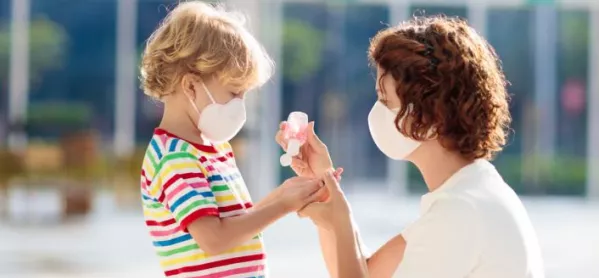Teachers “do not require” personal protective equipment, and must instead focus on social distancing measures to limit the spread of coronavirus, the government has said.
The advice for schools, colleges and childcare settings remains to follow steps on social distancing, handwashing and other hygiene measures, according to the Department for Education (DfE).
Updated guidance, published today, says school staff do not need personal protective equipment (PPE), even if working with children who “may be unable to follow social distancing guidelines”.
Related: ‘Prioritise teachers for PPE and testing’
Coronavirus: Teacher protection ‘a matter of urgency’
DfE: Williamson acknowledges teacher anxiety
In this case, they would “need to increase their level of self-protection, such as minimising close contact (where appropriate), cleaning frequently touched surfaces, and carrying out more frequent handwashing”, the DfE says.
Coronavirus: PPE ‘not necessary in schools’
The guidance states: “The scientific advice indicates that educational staff do not require personal protective equipment.
“This is needed by medical and care professionals providing specific close contact care, or procedures that create airborne risk, such as suctioning and physiotherapy, for anyone who has coronavirus (Covid-19), and is displaying symptoms.
“If you are not providing this care to someone with the virus, and displaying symptoms, PPE is not needed. Asymptomatic people (people with the virus but not displaying symptoms) have a reduced viral load and so risk of transmission is considerably reduced.
“The virus that causes Covid-19 is mainly transmitted through droplets generated when an infected person coughs, sneezes or speaks. These droplets are too heavy to hang in the air. They quickly fall on floors or surfaces.
“The advice for schools, colleges and childcare settings is to follow steps on social distancing, handwashing and other hygiene measures, and cleaning of surfaces.”
It adds: “Some children, and young people with special educational needs, may be unable to follow social distancing guidelines, or require personal care support.
“In these circumstances, staff need to increase their level of self-protection, such as minimising close contact (where appropriate), cleaning frequently touched surfaces, and carrying out more frequent handwashing.
“We will shortly publish additional advice for settings caring for children and young people with complex needs.”
The new DfE guidance also states that, as much as possible, children, young people and staff “should be spaced apart at all times”.
This means:
- Sitting children at desks that are far apart.
- Ensuring that everyone queues and eats further apart than normal.
- Keeping apart when in the playground or doing any physical exercise.
- Visiting the toilet one after the other.
- Staggering break times.
- Putting guidelines on the floor in corridors.
- Avoiding unnecessary staff gatherings.
It adds: “Social distancing measures should also be in place when providing meals, or food for collection, from families of free school meal pupils not in school.”




